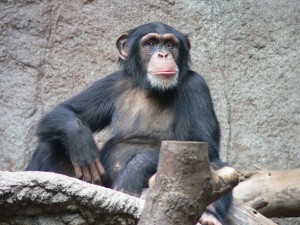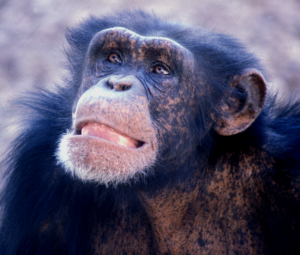Perhaps humans are not the smartest primates on Earth — at least not in every sense. If you saw Rise of the Planet of the Apes and its sequel Dawn of the Planet of the Apes this summer, you might have seen a terrifying version of Earth in which a surviving fragment of human civilization battles against an intelligent population of apes. This idea of superior intelligence in other species has inspired scriptwriters, novelists, and research scientists alike. And now, recent research suggests that this concept may be closer to reality than we think.
In September, Yale neuroscience postdoc Madhuvanthi Kannan wrote an article for Scientific American about a study on chimp intelligence published in June in Nature Scientific Reports. In this study, Colin Camerer and Tetsuro Matsuzawa, professors at the California Institute of Technology and Kyoto University, had chimpanzee pairs and human pairs play competitive games to win prizes. The games had players touch left or right squares on a screen by trying to predict what the other player would pick. One player was designated as the “matcher” and received prizes when both players’ choices matched; the other was the “mismatcher,” and received prizes when their choices did not. The scientists conducted a series of three games – the first with equal weight to all choices, and the second and third with asymmetric prizes – giving three apple cubes for a left-left matching win, but one for a right-right matching win. They next had a human vs. human game against which the scientists compared chimp results.

Researchers found that the games played by the chimpanzees closely followed the expected results for an optimal game as predicted by game theory: one in which each player chooses the best possible choice based on the history of decisions made by the other player. In such games, the players’ choices tend to approach an equilibrium state, dubbed Nash equilibrium. The chimps’ games hovered around Nash equilibrium, but the humans deviated much more from it.
Does this mean that chimps are smarter than us? Perhaps in certain ways. How well the chimpanzees followed game theory equilibrium may indicate that they are better than us in competitive strategy. This phenomenon may be because humans have evolutionarily foregone some aspects of mental capacity, like working memory, in favor of higher-level functions such as language abilities. Humans are unique in their capacity to use grammar, which chimpanzees have not grasped. These differences may arise, in part, from our distinct genetic and epigenetic profiles. In addition, the environment plays a major role in shaping behavior. The society in which we live cannot compare to the competition-driven society of chimps, where fights for limited resources and dominant positions cultivate competitive strategy thinking early during development.

However, Kannan is skeptical that a drastic future like the one in Rise of the Planet of the Apes could come true. “The movie is right about humans being smart enough to genetically alter chimps, but so wrong to assume that we cannot develop an antidote to a virus in ten years!” she said. The sophisticated brain is indeed mankind’s biggest strength.
